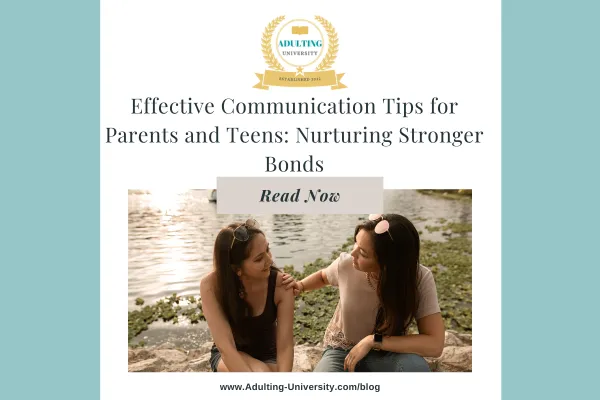
Effective Communication Tips for Parents and Teens: Nurturing Stronger Bonds
Effective Communication Tips for Parents and Teens: Nurturing Stronger Bonds
Effective communication is the foundation of any healthy parent-teen relationship. It fosters understanding, trust, and mutual respect, allowing both parents and teens to navigate the challenges of adolescence with greater ease. In this comprehensive guide, we'll explore key communication strategies and techniques that will enhance the quality of your interactions and help build stronger connections between parents and teens.
Understanding the Teenage Perspective
Before diving into communication tips, it's essential to recognize the unique perspective of teenagers. Adolescence is a period of rapid change and self-discovery. Here are a few things to keep in mind:
Emotional Intensity: Teenagers often experience heightened emotions, which can be intense and overwhelming. Understanding and acknowledging their feelings is vital.
Desire for Independence: Adolescents crave autonomy and independence. They want to make their own decisions and have a say in their lives.
Peer Influence: Friends play a significant role in a teenager's life. Peer pressure, both positive and negative, can impact their choices and behaviors.
Identity Formation: Teens are in the process of discovering who they are, what they believe, and where they fit in the world. They may experiment with different personas.
Academic and Social Pressures: The transition to high school and academic pressures can be challenging for many teens. Balancing academic responsibilities, extracurricular activities, and a social life can be overwhelming.
Communication Tips for Parents
Here are effective communication strategies for parents to bridge the generation gap and establish positive connections with their teens:
1. Active Listening
Practice active listening by giving your full attention when your teen is speaking. Maintain eye contact, avoid interrupting, and show empathy towards their emotions and experiences. Reflect their feelings by saying, "I can see that you're feeling [emotion]."
2. Open-Ended Questions
Ask open-ended questions to encourage meaningful conversations. Instead of asking, "How was your day?" try, "Can you tell me about something interesting that happened today?" This prompts your teen to share more details.
3. Respect Their Independence
Acknowledge your teen's desire for independence and decision-making. Give them opportunities to make choices and express their opinions. Even if you disagree, respect their right to have a say in their life.
4. Be Empathetic
Empathy is key to connecting with your teen on an emotional level. Show understanding and validate their feelings, even if you don't agree with their perspective. This builds trust and rapport.
5. Stay Calm and Patient
Teenagers can be moody, and conflicts are inevitable. Maintain your composure, even in challenging situations. If a discussion becomes heated, consider taking a break and revisiting the topic later.
6. Mind Your Body Language
Nonverbal cues are powerful. Be mindful of your body language, as it conveys your feelings and intentions. A relaxed posture and friendly facial expressions create a welcoming atmosphere.
7. Set Aside Quality Time
Dedicate quality time to spend with your teen doing activities they enjoy. This fosters positive interactions and allows you to bond in a relaxed setting.
Communication Tips for Teens
Effective communication is a two-way street. Teens also play a crucial role in fostering healthy parent-teen relationships. Here are some strategies for teens:
1. Be Honest
Honesty is essential for open communication. Express your feelings and thoughts truthfully, even if they are difficult or uncomfortable.
2. Use "I" Statements
When discussing your needs or concerns, use "I" statements to express yourself. For example, instead of saying, "You never listen," say, "I feel unheard when..."
3. Avoid Blame
Try to avoid blaming your parents or becoming overly defensive. Focus on discussing the issue at hand and finding solutions.
4. Be Open to Feedback
Accept feedback from your parents with an open mind. Constructive criticism is an opportunity for personal growth.
5. Practice Patience
Remember that effective communication takes practice. Be patient with yourself and your parents as you work on improving your communication skills.
Resources for Improving Communication
Parents and teens can utilize various resources to enhance their communication skills and strengthen their relationships:
Books: Several books focus on parent-teen communication, such as "How to Talk So Teens Will Listen & Listen So Teens Will Talk" by Adele Faber and Elaine Mazlish.
Counseling: Family counseling or therapy can provide a safe space for parents and teens to address communication challenges.
Parent-Teen Workshops: Many organizations offer workshops and classes specifically designed to improve parent-teen relationships.
Online Communities: Online forums and communities provide a platform for parents and teens to connect with others facing similar challenges.
Mental Health Services: In situations involving emotional distress, consider seeking guidance from mental health professionals.
Conclusion
Effective communication is the cornerstone of a healthy parent-teen relationship. By understanding the unique perspectives of teenagers and implementing communication strategies, parents can nurture stronger bonds and support their teens during the tumultuous years of adolescence. Likewise, teens can contribute to positive communication by being open, honest, and patient. Building effective communication skills is a valuable investment in creating a foundation of trust, understanding, and love that will last a lifetime.

